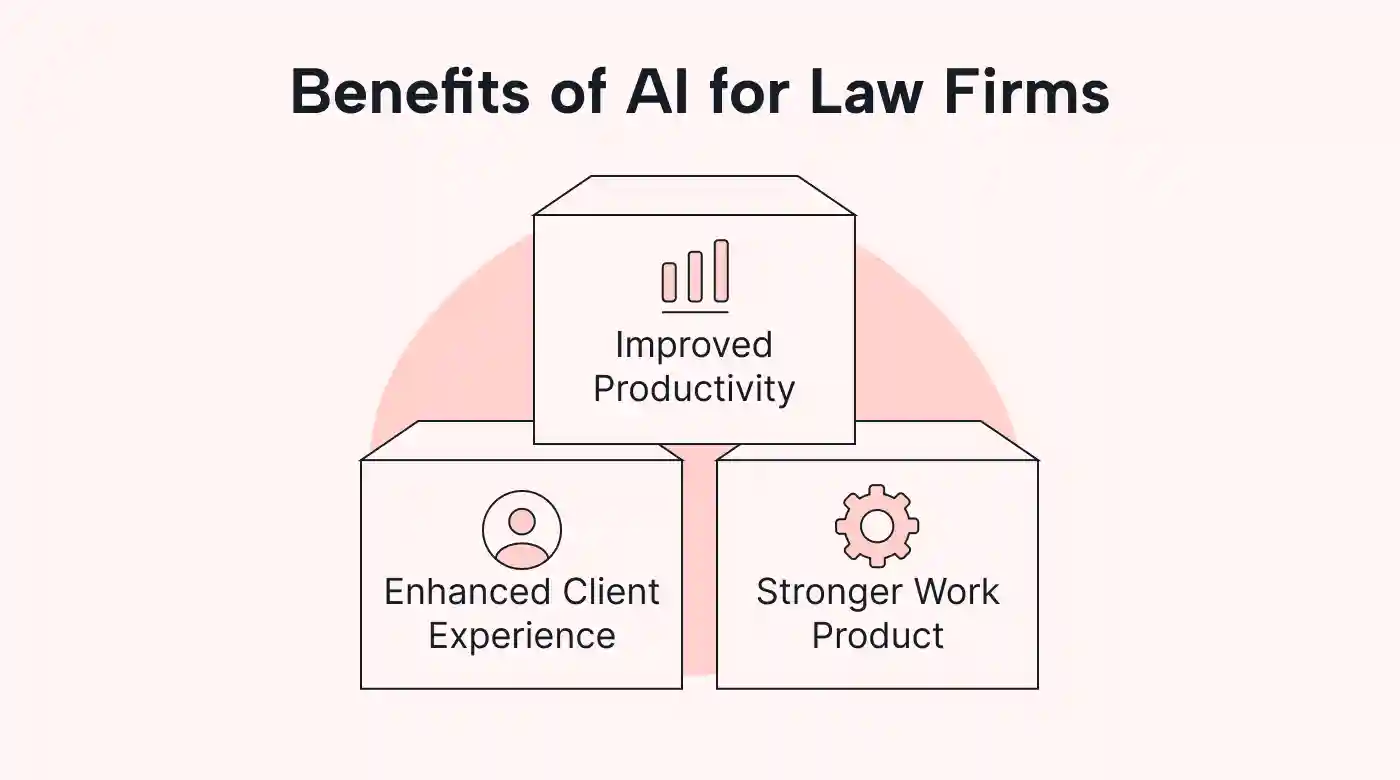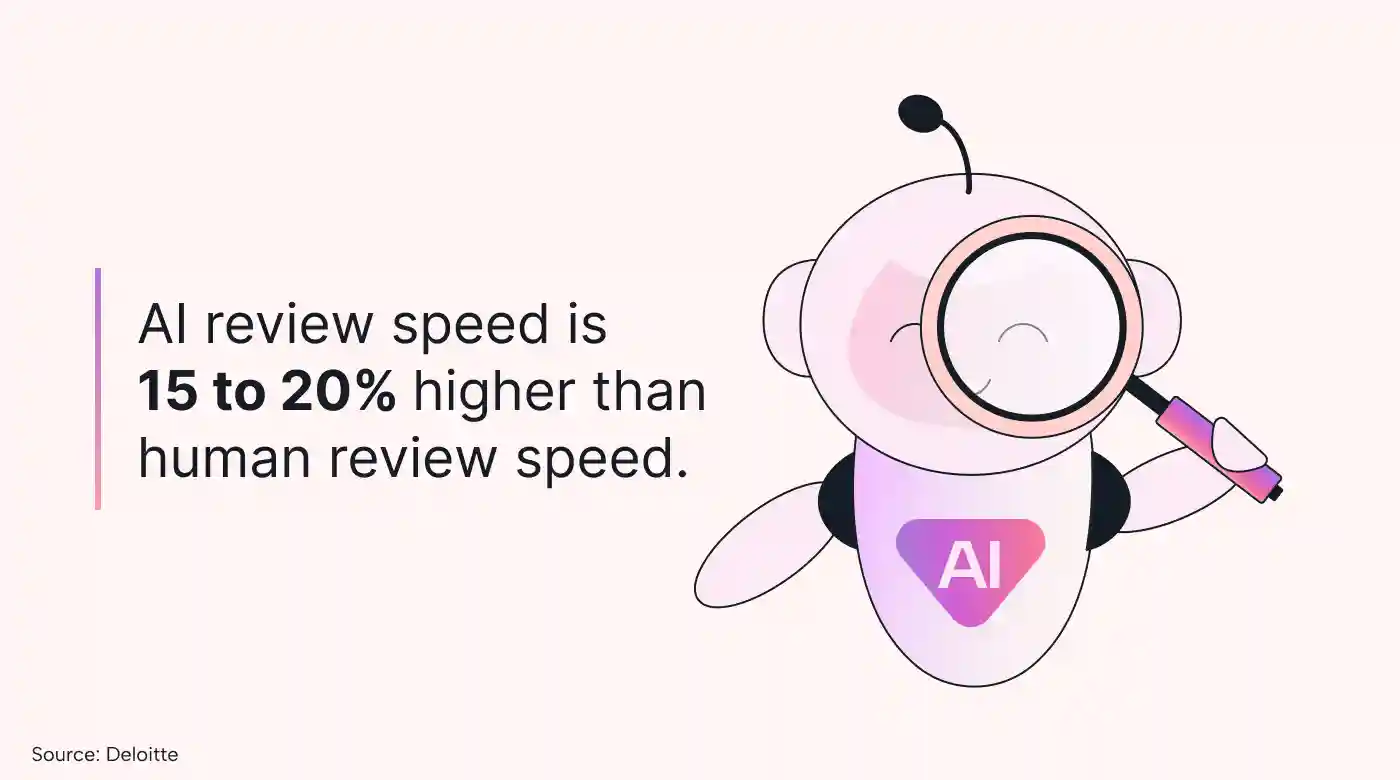A successful law practice has many demands, some of which might keep you up at night.
Managing multiple clients, meeting deadlines, and drafting documentation — not to mention the hours spent in legal research and discovery — can leave you burning the candle at both ends.
Why not make it easier on yourself?
AI is gaining momentum with lawyers — and for good reason.
This article discusses how you can apply different forms of AI to benefit your law practice. It also includes benefits, best uses, and potential challenges of using AI in law, as well as tools you can start using in your practice now.
What is AI for lawyers?
Law firms use AI to automate tedious, time-consuming, or repetitive tasks. With these tasks streamlined, lawyers can better focus on the client experience and, as a result, deliver better results.
Two types of AI are particularly helpful to law firms.
- Reactive AI is designed to perform a specific task. It combs through vast volumes of data to respond to specific questions.
- This type of AI doesn’t draw from a memory base or make improvements the more you use it. It simply reacts to the present data to form responses.
- Limited memory AI is closer to mimicking the human brain. When you enter a keyword into this type of AI program, it generates novel content based on previously acquired information, historical data, and current parameters.
- Although it doesn’t store your information, limited memory AI learns and improves over time.
More and more law firms are implementing AI-powered technology.
In a recent survey of legal professionals, 80% said they feel AI will be transformative for improving day-to-day efficiency with research and routine tasks. Not only that, but 62% of legal professionals believe that incorporating generative AI will separate successful law practices from unsuccessful ones within five years.
If that’s not enough to convince you to try it out, let’s now look into some of the main benefits of AI for lawyers.
What are the benefits of using AI in law firms?
AI provides legal professionals with three crucial benefits: improved productivity, an enhanced client experience, and a better product.
 |
Improved productivity
AI can help you complete highly repetitive, monotonous, and routine tasks. In fact, Goldman Sachs estimates about 44% of legal work tasks have the potential to be completed through AI automation. Just imagine AI helping you take back almost half of the traditional workweek.
AI completes legal research, reviews legal documents, and fact-checks and proofreads — tasks that traditionally take a significant chunk of time — freeing you up for other responsibilities.
One study even showed that using generative AI boosts productivity by 66% in businesses across industries.
AI use can also lead to considerable cost savings. With less time spent on lengthy, repetitive processes, firms can shift their resources and pass the savings on to their clients.
Enhanced client experience
Automating those highly repetitive tasks allows lawyers to focus more on their clients. You’ll be able to dig deeper into big-picture issues to help your clients get results because you’ll have the headspace and time.
Deeper insights derived from AI allow for better overall representation as you analyze the data and determine client preferences.
AI can help bolster client engagement, too, as you provide an increasingly personalized experience. This leads to even more positive reviews and word-of-mouth recommendations.
Stronger work product
AI can quickly scan larger volumes of data to locate important details that might have been impossible for the human brain to find.
Your decision-making will be more streamlined, too. AI provides data-driven insights so you can offer your clients even better legal recommendations.
With these benefits in mind, let’s turn to how law firms use AI to benefit their practice.
How is AI used in law?
Law firms use AI to improve their productivity and save time on labor-intensive tasks. Here are some of the primary ways you can implement AI in your legal practice — with a few recommended tools.
Productivity
AI offers law firms a significant boost in their productivity.
Consider how much time you spend each week planning and organizing your schedule, booking meetings, and updating your to-do list.
An all-in-one platform like Motion completes these tedious tasks for you.
 |
With Motion’s Intelligent Calendar, you enter your action items, meetings, focused work blocks, and personal to-do’s. Motion then takes your priorities and slots them into your schedule for you. You won’t have to worry about missing deadlines because Motion automatically makes the necessary adjustments when it needs to.
You’ll also notice increased efficiency with Motion. You can automatically assign tasks to your team, including deadlines, so everyone will know when they need to be completed. You’ll be able to check your teams’ calendars quickly, too, to determine their meeting availability and schedule a group chat when everyone’s free.
Add essential notes, critical attachments, and documents to your projects to keep everyone on the same page. Plus, add and respond to comments for each project as you go along.
Motion also helps protect your time, as you have the option to set time blocks for completing deep, focused work.
 |
If you prefer a 2-hour block in the morning and set it as a “no-meeting” time, for instance, Motion will reset your other priorities to prevent interruptions.
Legal research
Law firms also find value in using AI to support legal research.
AI-powered software can scan large volumes of data to help you locate critical information relevant to your clients and cases, including the following:
- Statutes
- Regulations
- Court opinions
- Case laws
- Legal codes
- Precedents
- Relevant jurisdictions
Blue J combines AI with legal expertise to answer pressing questions quickly. Simply type your question into the Ask Blue J platform, which will scan its database to provide the answer, the source(s) of the answer, and even highlighted passages for verification. It then gives you related case histories, statutes, and regulations to support your case.
Blue J’s Diagramming feature also lets you craft expert diagrams with integrated metadata and share them with your team members immediately.
Casetext is another AI tool aimed at streamlining the research process and more. Each question is answered with supporting documentation. You can also enter deposition information and receive an outline within minutes or complete an internal document review through the tool’s CoCounsel feature.
E-discovery
E-discovery leverages machine learning to scan documents for important information.
 |
AI is equipped to scan large volumes of information in a fraction of the time that it takes for humans to do so.
Use AI to scan electronic information and discover relevant, non-privileged documentation to support your case.
AI can also highlight important communications and themes, leading to better strategies and approaches you can use with your clients.
Office 365 E-Discovery includes three different levels to choose from and the opportunity to try each level before deciding. Its most comprehensive level, E-Discovery Premium, includes legal hold notifications, custodian management, and end-to-end workflows to identify and analyze your content.
DISCO for law firms streamlines the e-discovery process through one comprehensive platform. AI will identify relevant documents quickly, complete quality control, and produce a table of contents for easy reference.
Law firms who have used DISCO have enjoyed a 50% reduction or more in document review.
Virtual assistants
Virtual assistants are another AI option that provides law firms with valuable cost savings. Specifically, they support lawyers with two main roles:
- An AI legal assistant can review contracts, generate language suggestions, or summarize agreements.
- Latch is a contracting assistant that helps review contractual agreements, modify language, and generate summaries. It’s also a GPT-4 product, which its website notes “scored in the 90th percentile of test-takers in a simulated bar exam.”
- Additionally, Latch connects to Microsoft Word, so you won’t need to transfer lengthy contracts to another platform each time you’re ready to review.
- An AI virtual receptionist provides an option for your legal answering service. It can answer calls, screen potential clients, collect new client information, and schedule appointments.
- Smith.ai offers the benefits of AI but with a human touch. Its receptionist staff work 24/7 to handle the phones. They will even follow up on email or website leads, check in with clients by email after each call, and connect new appointments or tasks to your schedule in real time.
Documentation
Now, it’s time to examine how AI supports your documentation needs.
 |
Save valuable time by using AI to:
- Draft contracts
- Organize legal files
- Create documents
- Analyze contracts, files, and documents
- Review, edit, and proofread your content
If you want to focus on contract review, check out Legly. This platform focuses on making contract reviews as easy as possible. You’ll also mitigate your risks, as the AI reduces the chances of missing critical information. Once the contract is reviewed, Legly generates a visual overview with key data collected, analyzed, and highlighted.
ChatGPT-4 is a generative AI software that you’ve probably already heard of. With it, you enter a prompt, and the AI combs through various sources, including textbooks, websites, and other educational materials, to predict and generate the best response. Use this AI-powered software to draft initial documents, transcribe audio or video files, or craft emails.
As you start to implement AI in your law practice, there are a few key things to keep in mind.
What are the key considerations for lawyers using AI?
Law firms must consider confidentiality, ethics, system ease, and overall value when deciding how to use AI successfully.
Client confidentiality
Confidentiality will be top of mind as you start implementing AI. The tool you use should have robust security protections to guard against data breaches. You’ll also want to verify how the data will be stored and accessed.
Popular tools like ChatGPT still have some kinks to work out when it comes to security. Right now, for example, the data you enter into the tool is used to train the machine.
You can turn off your chat history to stop your conversations from being used to train the AI. Or you can use the business subscription to gain more control over your clients’ data. The business-level version adheres to OpenAI's API data usage policy and doesn’t share users’ data to train the AI.
Ethical considerations
While AI has enormous scanning, reporting, and generating abilities, it’s not neutral. You’ll need to monitor your content to prevent inaccuracies and inadvertent biases from cropping up.
Ease of use
Depending on what the AI is aimed to do, you may need to devote time to learning how to use the product efficiently or provide training to your team.
You’ll also want to note whether the platform is responsive, intuitive, and easy to use, as well as whether it offers your preferred integrations.
 |
For example, Motion connects to many of your favorite apps natively, allowing you to schedule meetings, join video conference calls, or send emails with ease. It also integrates with Zapier, instantly providing even more options.
Value
Does the tool’s cost-benefit ratio measure up, even if you need to devote time to training?
Does the platform offer easy integrations, including opportunities for collaboration and shared systems from one easy place?
If you’re looking to increase productivity, save money, and deliver better client outcomes, then giving AI a try is likely worth it.
Boost your productivity with Motion
Now that you know the different ways AI for lawyers will benefit your practice, it’s time to narrow your scope.
Why not start by focusing on your productivity?
Motion offers everything you need to handle multiple clients, schedule meetings, block time on your schedule, and keep everyone in the loop. It will even let you know if you won’t be able to meet a deadline and show you how to adjust your schedule accordingly.
Don’t wait to boost your productivity in your law practice. Get started with your 7-day free trial today.

Jodi Monroe is a content writer and blogger in the SaaS space. When not at her laptop, she’s planning her next travel adventure.




